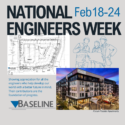A LONG HISTORY
National Surveyors Week is celebrated annually during the fourth week of March; this year it takes place during March 20th – 26th. The theme for this year’s celebration is communication, a vital aspect of every day work.
The event was first created by the American Congress on Surveying and Mapping (ACSM) in February of 1984. Additionally, the 40th President of the United States, Ronald Reagan, signed a Presidential Proclamation that asked citizens to acknowledge professional surveyors and their notable contributions.
Interestingly, there are many famous land surveyors from over the years who have played a vital role in the settling of our country. George Washington, the first recognized land surveyor, may be the most famous of them all. Surveying has made a long-lasting effect on our society and can be attributed for much of America’s success in settling early on. The impact that the profession has made is evident through our country’s history in which Surveying practices are reported as far back as 1400 BC by the Egyptians.
This week is not only a great time to recognize the contributions that surveyors have made, but also a time to raise awareness of the profession through education, media, and public service.
THE IMPORTANCE OF SURVEYING
Surveyors provide the foundation for sound engineering. The precise information they collect regarding the shape and contour of the earth’s surface is the starting point for planning projects and developing solutions. John McLain, Baseline’s Founder and CEO, is passionate about this foundational role that surveying plays for the quality of our projects and firm overall.
“The quality of information provided by a land surveyor directly affects engineering design and the efficiency of the construction process for residential developments, commercial projects, and public infrastructure improvements. A land surveyor must provide sound base topography as well as accurate boundary information. Before purchasing or selling land, it’s imperative to understand the size and boundaries. Most lending agencies require an ALTA/ACSM survey before committing to financing for commercial and industrial properties. This type of survey accurately depicts boundary configurations, recorded easements, and specifies interior and adjacent improvements affecting the property. Our surveyors at Baseline understand these precise requirements to ensure all regulations are met and your construction project runs smoothly.” John McLain, PE, Founder of Baseline
BASELINE’S ROOTS
When Baseline Engineering Corporation was first created in 1998, civil design was our expertise. However, Baseline quickly developed as a company and continued offering more services. In 2001, land surveying services were added and 21 years later, it remains a key service we provide as a comprehensive engineering, surveying, and planning firm.
Since the company began, Baseline has grown immensely from its few initial staff members to a 14-person survey team. Spread across four Colorado offices, our survey team provides a range of services including ALTAs, topographic, boundary, and right-of-way surveys, construction staking, FEMA flood elevation certificates, and more. John McLain adds, “today, we are proud of the growth and diversity of our survey department that allows us to meet today’s demands—from boundary and base mapping all the way through construction staking and as-builts.”
SURVEY THE SURVEYORS
In honor of this week, and the impactful role surveyors have played in our firm’s success, we reached out to members of our survey staff to learn more about the profession. They were asked to reflect upon their experiences as surveyors, and answer the following questions. See what they had to say below:
What skills are the most crucial to succeeding in this career? What type of person do you need to be?
“There are many skills that are crucial for succeeding as a land surveyor. Communication skills are a vital tool that surveyors must have. Everyday there is coordination with clients, landowners, general contractors and fellow employees. There is also a big technical component to the profession, including many rules and statutes to follow on the state and local levels. Along with the knowledge of the technology and tools we us every day. I think in order to work and succeed in the industry you need to be able to adapt quickly. Every day is different in many aspects from the type of project you are working on, to the location and the staff and clients you are working with.” Aaron Demo, PLS, Survey Division Manager
“Math skills and the ability to visualize. Focused, dedicated, and able to see the big picture.” David Wilson, Project Manager
“There are many requirements to becoming a surveyor a few of the most critical are to be self-driven, loyal, reliable and hard working. The person should have a good understanding of research and a love for the outdoors (in all kinds of weather).” Doug Lancaster, LSIT, Project Manager
“Skills: Math and the ability and willingness to learn. You need to be a person that holds themselves accountable.” Duncan Hotchkiss, LSIT, EIT, Project Manager
“Patience and multi-tasking.” Jason Hawley, Project Manager
“The ability to continue learning and being open to new ideas and technology.” Jayme Hobin, Survey Chief/CAD Technician II
“Obviously it is important to be observant and spatially aware in the field. It requires working with both your hands and mind to accomplish work. It is worth understanding the different kinds of tasks a surveyor has, such as: construction staking, boundary surveying, or design topos. To enjoy this job, you also must enjoy being outdoors and have a tolerance for varying weather.” Lucas North, Survey Intern
Are there any expectations you had about this career path that you have found differed from reality?
“I wasn’t aware of the profession when I was fresh out of high school. I was set on another career path. I stumbled upon the profession that combined the technical aspect that I enjoyed, and the outdoors. I didn’t know what to think and didn’t have expectations. Once I learned about some of the ins and outs of surveying, I was pleasantly surprised.” Aaron Demo, PLS, Survey Division Manager
“The main career path was to provide for my family and enjoy the work. In the past, I have met some very interesting people and seen incredible country.” Doug Lancaster, LSIT, Project Manager
“It’s one of the oldest professions in the world, I didn’t expect people to be so confused by what I do.” Jayme Hobin, Project Manager



